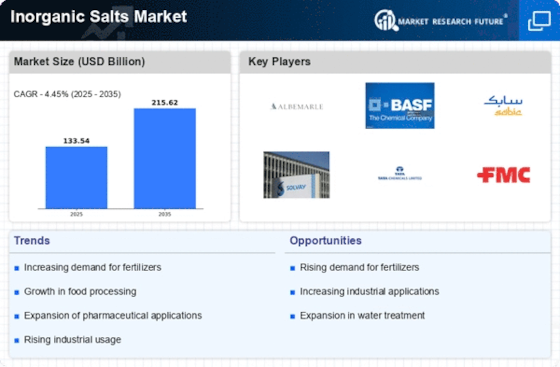Top Industry Leaders in the Inorganic Salt Market

The inorganic salts market, encompassing a diverse range of compounds like chlorides, nitrates, and sulfates, is a vital cog in the global economy, fueling industries from agriculture and construction to pharmaceuticals and chemicals. This space is witnessing fierce competition among established players and new entrants alike.
Strategies Shaping the Game:
- Diversification and Expansion: Leading players like Lanxess and Solvay are diversifying their product portfolios to cater to niche applications and emerging markets. Acquisitions and strategic partnerships are common tactics, as exemplified by K+S's acquisition of AkzoNobel's Specialty Chemicals business in 2021.
- Innovation and Sustainability: R&D is key to staying ahead. Companies like Merck KGaA are investing in developing high-purity salts for pharmaceutical applications and environmentally friendly salt production processes. Sustainability initiatives are gaining traction, with players like Tata Chemicals focusing on renewable energy integration and carbon footprint reduction.
- Cost Optimization and Operational Efficiency: Optimizing production processes and supply chains is crucial for cost competitiveness. Companies like ICL are implementing digitalization and automation solutions to improve efficiency and reduce costs.
- Regional Focus and Customization: Tailoring offerings to specific regional needs is crucial. Companies like Yatai Electrochemistry Co. are focusing on the growing demand for high-purity salts in China, while FMC Corporation is expanding its reach in Latin America's agricultural market.
Market Share Determinants:
- Product Mix and Quality: Offering a diverse range of high-quality salts tailored to specific applications is critical. Companies like Sigma-Aldrich and Thermo Fisher Scientific are known for their extensive product portfolios and commitment to quality control.
- Brand Reputation and Customer Relationships: Building strong brand recognition and fostering long-term customer relationships is key. Companies like AkzoNobel and BASF leverage their established reputations and extensive customer networks to maintain market share.
- Cost Competitiveness and Geographical Reach: Efficient production, optimized supply chains, and a strong global presence are crucial for cost competitiveness. Companies like Tata Chemicals and K+S have established themselves as low-cost producers with extensive distribution networks.
- Regulatory Compliance and Environmental Responsibility: Adherence to strict regulations and a commitment to environmental sustainability are increasingly important. Companies like Solvay are actively involved in industry associations and initiatives promoting responsible salt production and management.
List of Key Players in the Inorganic Salts Market
-
Redmond Clay & Salts Company (Utah, U.S.)
-
United Salts Corporation (Texas, U.S.)
-
Eastman Chemical Company (Tennessee, U.S.)
-
Arkema (Colombes, France)
-
Solvay (Brussels, Belgium)
-
Tata Chemicals (Mumbai, India)
-
GFS Chemicals (Ohio, U.S.)
-
Otsuka Chemical (Gurugram, India)
-
Behn Meyer (Hamburg, Germany)
Recent Developments:
October 2023: Behn Meyer Holding AG partners with a leading renewable energy company to develop a carbon-neutral salt production process.
November 2023: The Indian government announces subsidies for local inorganic salt producers, aiming to boost domestic production and reduce reliance on imports.
December 2023: A research consortium announces a breakthrough in developing biodegradable polymers from inorganic salts, opening doors for new applications and sustainable packaging solutions.










